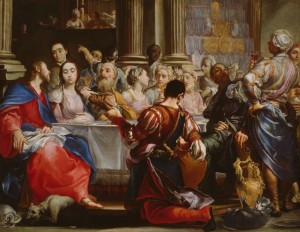Parable

FIRST, I WILL tell you what “The Parable of the Ten Bridesmaids” is not:
It is not a dark comedy starring Kristen Wiig, Kristen Stewart, Kristen Bell, and six other Kristens about a bachelorette party’s riverboat cruise crashing on the shores of a money-crunched Christian summer camp.
“The Parable of the Ten Bridesmaids” is also not a Sufjan Stevens song about the 10 different types of clouds that hang over Lake Michigan in late autumn, just as wedding season draws to a close.
And, like most campfire tales Jesus told, it is not singular in its meaning.

THE PARABLE OF the mustard seed is beloved, but also dangerous. Like most beloved scripture passages, its revolutionary impact on its original hearers has been weakened over time, replaced by sentimental fondness.
Originally, the parable would have promised restorative justice to the economically afflicted, an undermining of borders and boundaries to the religious purists, and a warning against exulting oneself. Part of the genius of Jesus’ parables was to speak on multiple levels to multiple groups with the same words.
Noticing Jesus’ audiences for this teaching is profoundly important. Jesus was teaching in a gathering that included at least some religious leaders (Pharisees and scribes; see Matthew 12:38).
Leaving the house in which he was speaking, Jesus went down to the water to address an even larger crowd (Matthew 13:1-2). In his audience for the parable, there were a mix of religious leaders and ordinary people, including farmers of the fertile Galilean hills. Jesus used their respective expertise to provoke the different groups.
Tenant farmers
Jesus said the reign of God is like a mustard seed that a farmer took and sowed in the field. The agricultural workers who heard Jesus would have scoffed at this.
No one would ever sow mustard seed into any ground one owned. First-century farmers in Galilee with any agricultural acumen knew that mustard is a weed that reproduces rapidly and spreads indiscriminately. It chokes out other more-valuable crops and ruins the land for other uses. No farmer who loved the land would have planted a single seed of mustard in the field.
First-century farmers knew from Jesus’ story that the planter must not be a farmer who cared about the land, but someone who didn’t know anything about stewarding the land.

Baltimore, like Ferguson, is a parable — a story that can teach us important lessons. It's one in which we should see that we are, for the most part, still missing the most important lessons.
Decades of bad behavior on the part of Baltimore's police force in relation to the black community were brought to light, as in other circumstances of young black men dying at the hands of police. But the parable of Baltimore needs to go deeper.

WE LIVE IN A TIME of widespread violence. No country, no community, no person is untouched by violence. It is a complex problem stemming from our thought patterns and actions that are, in turn, shaped by various forces in our daily lives. Because violence is so complex, we often seek an easy answer—typically, naming a specific religion, culture, ethnicity, or nationality as a cause of the evil that perpetrates or stimulates violence.
But we all know that such scapegoating is another crime that only creates more violence. Each and every individual and community has good and bad, strength and weakness, merit and demerit. Just as no one is perfectly good, no one is perfectly evil. In her well-known book Eichmann in Jerusalem, philosopher and writer Hannah Arendt points out that evil is related to the lack of reflective thinking. “The longer one listened to [Eichmann],” writes Arendt, “the more obvious it became that his inability to speak was closely connected with an inability to think, namely, to think from the standpoint of someone else. No communication was possible with him, not because he lied but because he was surrounded by the most reliable of all safeguards against the words and presence of others, and hence against reality as such.”
For Arendt, to think reflectively means to be aware and to take into account the reality that one’s own life is always in relation to the lives of others. This is also what the biblical texts this month invite us to contemplate.

I have this friend Caitlin who tends to just tell me the truth about things, which isn’t always comfortable.
Caitlin and I close friends but are really different people, and years ago we were both planning our 40thbirthday parties. Mine was a roller disco party at a rink I rented out – and hers was a group of close friends watching the sunrise on a hill over looking the city, which made me comment that Caitlin has so many personality traits that are just truly lovely and that I don’t have those same traits and she said “Of course you do Nadia, they just aren’t your favorite ones.”
I thought about that this week when I was reading our Gospel text and how Jesus seems to be addressing the things we do or don’t do so that we can be thought of in a certain way. As though he can just see right through us. Which is just the worst.
One of the drawbacks intrinsic to liturgical worship is the length of time it takes to adopt expressions that are newly current and potent into the approved forms. Certain forms of language become deeply important to a generation—key words and symbols that are pregnant with meaning, yet haven’t been incorporated officially into our forms of worship. So we often feel a certain dissonance in church as the language of worship seems impoverished by the absence of expressions we value so highly in our own exploration into God today. I long for prayers that express, directly and passionately, that God suffers. I look forward to praising God’s vulnerability. I am impatient for the recasting of prayer to praise the Creator in terms that unequivocally embrace the evolutionary perspective. In the meantime, preaching is the key field for using this fresh language with passion, in an exciting conversation with ancient expressions and classic symbols that can never become out of date, as long as we use our imaginations to keep on releasing their latent powers.
The scriptures in this season provide rich opportunities for exploring great images of God’s transforming power in vulnerability. Has anyone coined the word “paradoxology” yet to express the essence of transformative Christian worship? Only paradoxical language can point with any degree of success to the mystery of God and the revelatory revolution that springs into life out of the action of Jesus, the passion of Jesus, and the resurrection of Jesus.

That whole camel through the eye of the needle thing: What is that about?
And, yes, the eye of the needle means exactly what you’re thinking. Not some gate in Jerusalem. Jesus said it’s easier for a camel to go through the eye of the needle that you used to stitch that Noah’s Ark for your child’s bedroom — than for a rich guy to get to heaven.
Let. That. Sink. In.
Unless some freakishly unexplainable phenomenon occurs where camels all of the sudden start popping out of needles (imagine the Discovery Channel documentary on that one), I have to conclude that no rich person will be in heaven.
Except that’s not the end of the story…

Because this week -- months after the Arab Spring, and after weeks of the growing Wall Street Occupation -- well, in this climate of discontent and dissent as we all begin to wake from our consumer induced coma to see how multi-national corporations control so much more than we can imagine, in a season when tyrants are being over thrown, I simply could not preach a sermon in which I say that God is like an angry murderous slave owning king. Maybe there is a way of finding good news in that but I just couldn't do it.
When I was growing up, there was a house down the street from us which had slightly tattered window coverings and the front lawn was like a graveyard of broken things. Posted on the fence was a "No trespassing" sign. I remember asking my mother what trespassing was so I could be certain not to do it to anyone who lived in that weird house. When she explained that it meant going into their yard uninvited I thought, no problem. Soon after that, when I first learned the Lord's Prayer, I thought it was weird that out of all the sins that Jesus would suggest we ask God to forgive it would be our trespassing. I pretty much made it a policy to stay out of strange yards, and since no one seemed to wander into ours uninvited, I thought I was covered. Only later did I realize that trespassing was only one of countless was to trespass against others. And now I get it -- kind of. Forgive us our sins as we forgive those who sin against us. Jesus always seems to be pairing God's forgiveness of us with our forgiveness of others.


So as I watched the final Hogwarts Express depart from Platform 9¾ in Harry Potter and the Deathly Hallows, Part II this past weekend (slightly teary-eyed, I confess), I started to wonder: What might it sound like to pray in the language of Harry Potter -- language that clearly resonates with folks around the world? Would it be cheesy? Probably. Profane? Perhaps. But I figured the God who relied on earthly parables about wineskins and fig trees to explain the Kingdom would understand.
At the conclusion of my blog post which asked, What Constitutes Sacred Space at Ground Zero?</